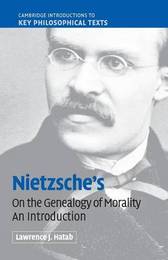
|
Nietzsche's 'On the Genealogy of Morality': An Introduction
Paperback / softback
Main Details
Description
Nietzsche's On the Genealogy of Morality (1887) is a forceful, perplexing, important book, radical in its own time and profoundly influential ever since. This introductory textbook offers a comprehensive, close reading of the entire work, with a section-by-section analysis that also aims to show how the Genealogy holds together as an integrated whole. The Genealogy is helpfully situated within Nietzsche's wider philosophy, and occasional interludes examine supplementary topics that further enhance the reader's understanding of the text. Two chapters examine how the Genealogy relates to standard questions in moral and political philosophy. Written in a clear, accessible style, this book will appeal to students at every level coming to read the Genealogy for the first time, and a wider range of readers will also benefit from nuanced interpretations of controversial elements in Nietzsche's work.
Author Biography
Lawrence Hatab is Louis I. Jaffe Professor of Philosophy at Old Dominion University.
Reviews'This is precisely the kind of book that one wants as a guide: it is written in clear prose, persuasive, insightful, and illuminating. It is distinctive in that it takes Nietzsche's work as a whole book rather than a collection of aphorisms or series of essays, and its examination of the work's prominent themes is insightful and helpful.' Professor Christa Davis Acampora, Hunter College, New York
|